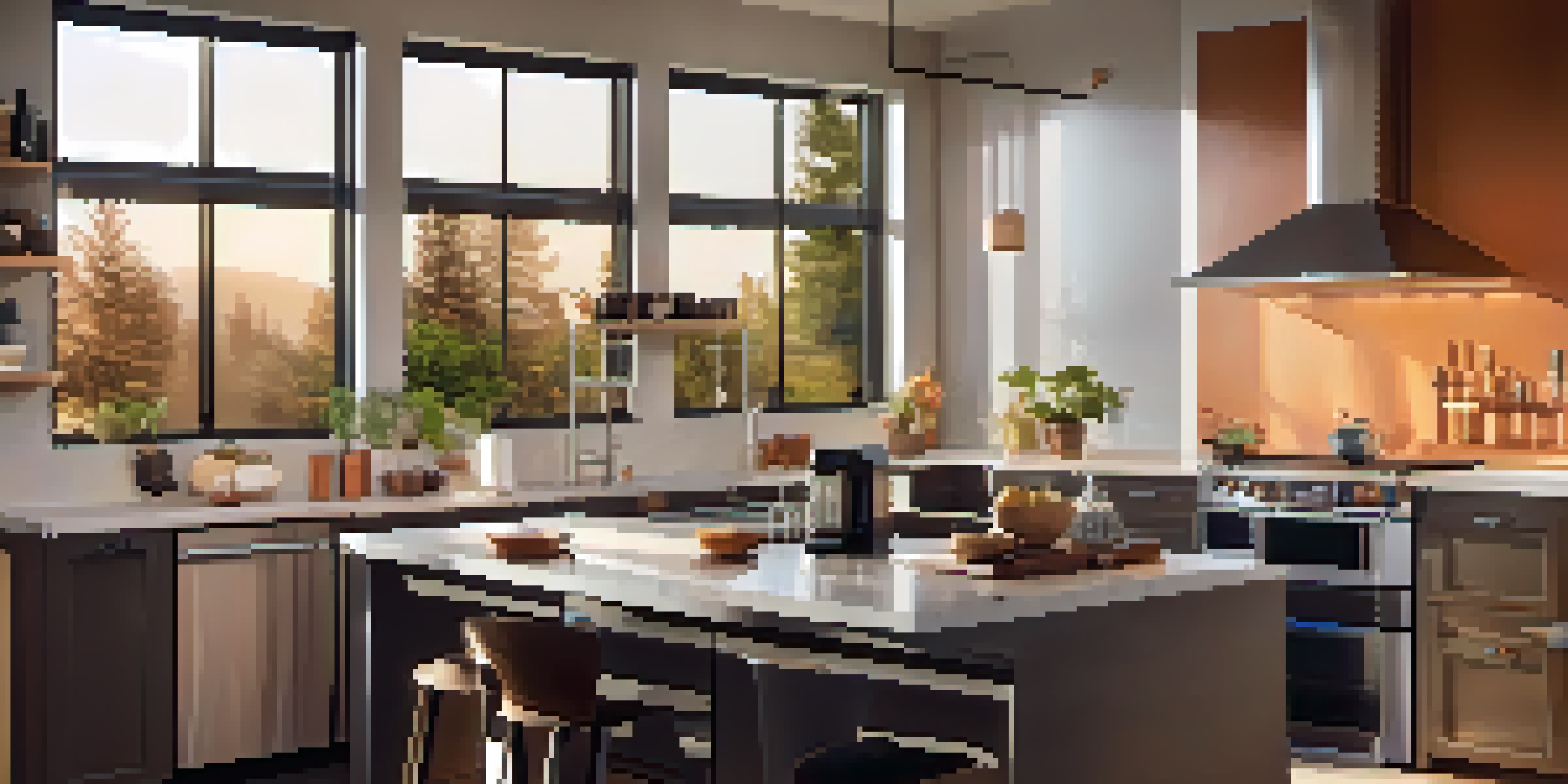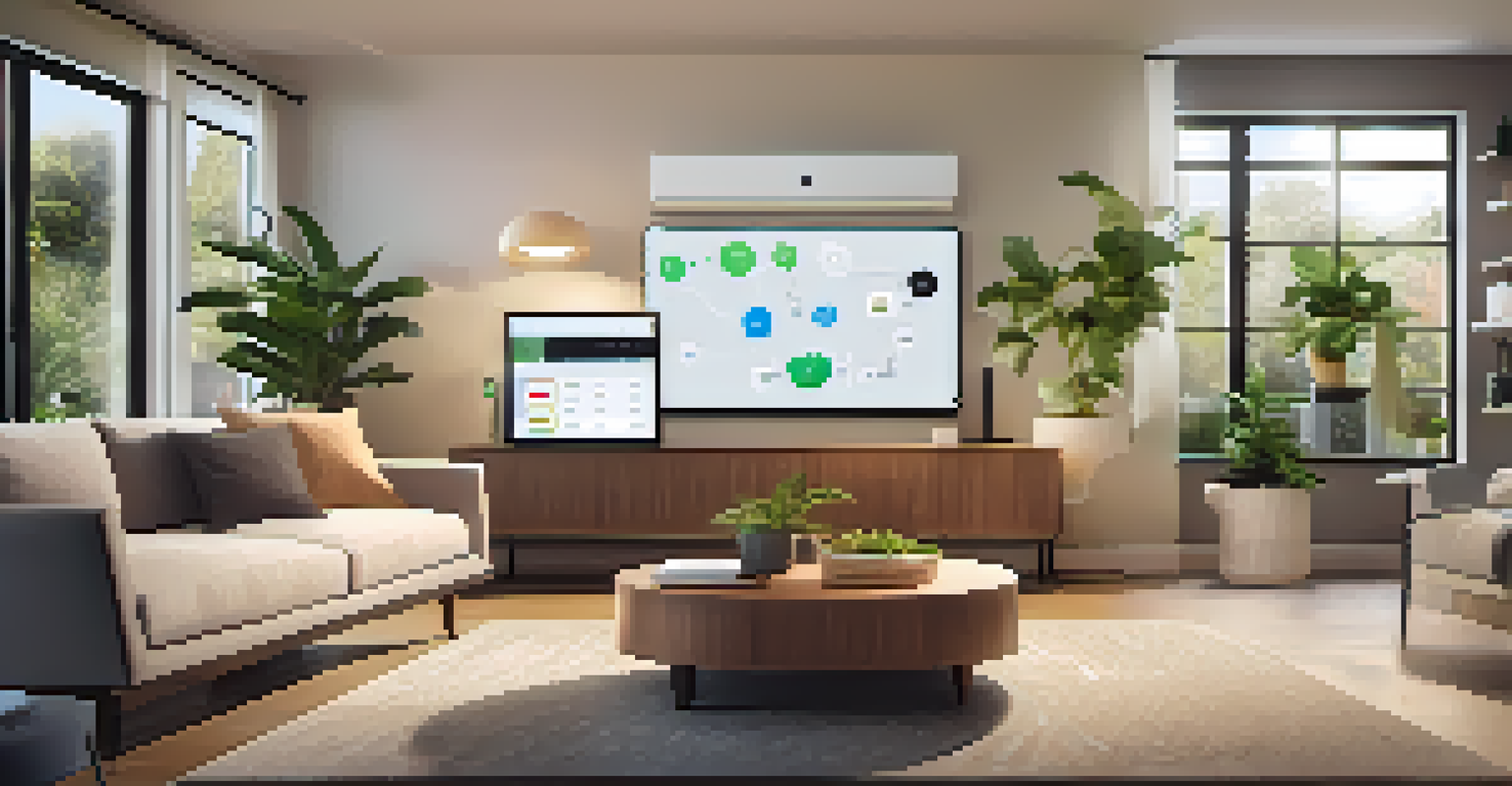Integrating Smart Devices for a Seamless Home Experience

Understanding Smart Home Technology Basics
Smart home technology refers to devices that connect to the internet, allowing you to control them remotely. This can include everything from smart lights to security cameras. Understanding the basics helps you make informed decisions about which devices will best suit your needs.
The technology you use impresses no one. The experience you create with it is everything.
At the heart of smart home technology is the concept of automation. Imagine waking up to the lights gradually brightening while your coffee brews in the kitchen. This level of convenience can make daily routines not only easier but also more enjoyable.
Moreover, smart devices often communicate with one another, creating a cohesive ecosystem. For instance, your thermostat can adjust the temperature based on data from your smart sensors, ensuring your home is always comfortable without you lifting a finger.
Choosing the Right Smart Devices for Your Home
With so many options available, selecting the right smart devices can feel overwhelming. Start by considering your lifestyle and needs. For instance, if you travel frequently, smart security cameras and locks can provide peace of mind.

It's also helpful to think about compatibility. Many smart devices work best when they belong to the same ecosystem, like Apple HomeKit or Google Assistant. This ensures seamless integration and a more user-friendly experience.
Smart Devices for Convenience
Smart home technology enhances daily routines by automating tasks and connecting devices for seamless control.
Additionally, don't forget about future scalability. Choose devices that can grow with your needs, allowing you to add new ones without a complete overhaul of your system. This foresight can save you time and effort down the line.
Creating a Centralized Smart Home Hub
A smart home hub acts as the central command for all your devices, enabling them to communicate effectively. Think of it as the brain of your smart home, coordinating everything from lighting to security systems.
Smart homes are the future, and they are a reflection of our growing need for convenience and security.
By using a hub, you can control all your devices from one app, making life much easier. Imagine adjusting your thermostat, checking your security cameras, and turning off the lights—all from your smartphone.
Moreover, hubs can often automate routines based on your preferences. For instance, you could set a 'goodnight' routine that locks your doors, dims the lights, and adjusts the thermostat, all with a single command.
Enhancing Home Security with Smart Devices
Smart security devices have revolutionized how we protect our homes. From video doorbells to motion-sensor cameras, these devices provide real-time monitoring and alerts. This means you can keep an eye on your property from anywhere, giving you peace of mind.
Many smart security systems integrate with your existing home automation. For example, you could set your outdoor lights to turn on when motion is detected, creating a well-lit area that deters potential intruders.
Enhanced Home Security Solutions
Smart security devices provide real-time monitoring and integrated features that improve home safety.
Additionally, some smart locks allow you to grant temporary access to guests or service providers. This feature adds convenience and security, as you can change codes or permissions remotely whenever needed.
Energy Efficiency Through Smart Home Integration
One of the most significant benefits of smart devices is their ability to enhance energy efficiency. Smart thermostats can learn your habits and adjust heating and cooling schedules accordingly, reducing energy waste.
Moreover, smart lighting systems allow you to control when and how your lights are used. For instance, you can set them to turn off automatically when no one is home, saving both energy and money.
By regularly monitoring your energy usage through smart devices, you can identify patterns that lead to waste. This empowers you to make informed decisions about your consumption, further contributing to a greener home.
Streamlining Daily Routines with Automation
Imagine starting your day with a seamless routine that requires minimal effort. With smart home automation, you can program your devices to perform specific tasks at certain times. For example, your coffee maker can start brewing as your alarm goes off.
Automation can also extend to your entertainment systems. By linking your smart speakers and TV, you could create a 'movie night' scene that dims the lights, closes the curtains, and plays your favorite film—all with a single command.
Energy Efficiency Benefits
Smart devices optimize energy usage, helping you save money and reduce waste through automation and monitoring.
This level of integration not only saves time but also enhances your overall living experience. With less manual work to manage your home, you can focus on what truly matters: enjoying your time with family and friends.
The Future of Smart Home Integration
The future of smart home integration looks bright, with technology evolving at an unprecedented pace. Innovations like artificial intelligence and machine learning are set to make our homes even more intuitive, learning our habits and preferences over time.
As more devices become interconnected, the possibilities are endless. Soon, your home might anticipate your needs before you even realize them, adjusting the environment to suit your mood or activity.

However, as we embrace this technology, it's essential to consider privacy and security. Staying informed about how your data is used and taking steps to protect your smart home will be crucial as we navigate this new landscape.